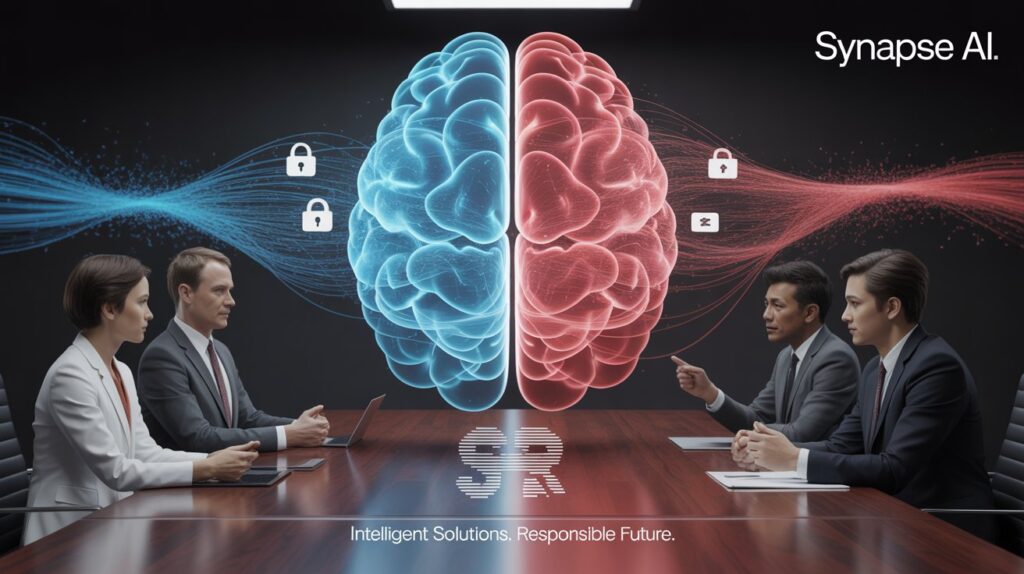Artificial Intelligence (AI) has rapidly moved from being a futuristic concept to a practical tool powering industries across the globe. From automating customer support to driving personalized marketing campaigns, AI is reshaping how businesses operate, compete, and grow. Yet with these transformative opportunities come significant responsibilities.
The conversation is no longer just about efficiency or profit. It’s about ethics—how AI impacts people, communities, and societies at large. As businesses adopt AI systems for decision-making in hiring, lending, healthcare, or law enforcement, the risks of bias, privacy breaches, misinformation, and job displacement become pressing issues.
This article takes a deep dive into the ethical concerns around AI in business, exploring why they matter, what the main risks are, and how organizations can create a roadmap for responsible AI adoption. You’ll also find practical frameworks, real-world examples, and actionable recommendations to help leaders balance innovation with accountability.
Why Ethics Matter in Business AI
Beyond Profits: The Reputation and Trust Factor
For businesses, reputation is one of the most valuable assets. A single scandal involving biased hiring algorithms or misuse of customer data can severely damage trust and brand equity. Customers today are more conscious than ever about how companies handle their personal data and whether algorithms treat them fairly.
Regulatory Pressures Are Rising
Governments and international organizations are rolling out regulations and guidelines to enforce ethical AI practices. The European Union’s AI Act, GDPR, and UNESCO’s recommendations are setting global precedents. Businesses that ignore these frameworks risk non-compliance, legal penalties, and exclusion from international markets.
The Strategic Advantage of Ethical AI
Companies that embed ethics into their AI strategies can differentiate themselves. Ethical AI not only reduces risk but also boosts consumer trust, employee satisfaction, and investor confidence. In a world where sustainability and responsibility influence customer decisions, ethical AI can become a unique selling point.
Key Ethical Concerns Around AI in Business
1. Algorithmic Bias and Fairness
AI systems learn from data. If the data reflects social inequalities, the AI will reproduce and even amplify those biases. This can result in discriminatory hiring processes, biased lending decisions, or unfair law enforcement practices.
Example: A recruitment AI tool trained on historical company data favored male candidates because the dataset reflected decades of male-dominated hiring patterns.
Mitigation Strategies:
-
Use diverse, representative training data.
-
Apply fairness metrics and bias audits.
-
Involve multidisciplinary teams in model evaluation.
2. Transparency and Explainability
AI often operates as a “black box,” making decisions without clear explanations. In business settings, lack of transparency can erode trust and create legal risks.
Why It Matters:
-
Customers may demand to know why they were denied a loan.
-
Regulators may require explanations for automated hiring decisions.
Solutions:
-
Use explainable AI (XAI) techniques.
-
Provide simplified explanations for non-technical stakeholders.
-
Establish accountability mechanisms for opaque models.
3. Privacy and Data Protection
AI thrives on data, but excessive collection and misuse can violate privacy rights. Companies that mishandle personal data risk lawsuits and regulatory action.
Key Issues:
-
Invasive surveillance (e.g., facial recognition).
-
Unclear consent in data collection.
-
Data leaks or misuse of sensitive information.
Best Practices:
-
Adopt data minimization principles.
-
Ensure GDPR and local compliance.
-
Encrypt and anonymize sensitive data.
4. Accountability and Liability
When an AI system causes harm—such as wrongful termination, a biased hiring rejection, or financial loss—who is responsible? The developer, the business using it, or the AI itself?
Business Implications:
-
Legal liability for harm.
-
Difficulty in proving negligence when algorithms are complex.
Approach:
-
Establish clear accountability frameworks.
-
Document decision-making processes.
-
Involve third-party audits for critical AI applications.
5. Job Displacement and Workforce Impact
AI-driven automation threatens certain roles, particularly repetitive and manual jobs. While new opportunities may arise, the transition can be disruptive.
Examples:
-
Customer service replaced by chatbots.
-
Manufacturing workers replaced by robots.
Responsible Actions:
-
Invest in employee reskilling.
-
Create transition programs for affected workers.
-
Balance automation with human oversight.
6. Security and Misuse
AI systems are vulnerable to cyberattacks and can also be weaponized. For example, deepfakes can spread disinformation, and adversarial attacks can trick AI models into dangerous errors.
Safeguards:
-
Build robust cybersecurity into AI systems.
-
Monitor misuse proactively.
-
Establish ethical guidelines for deployment.
7. Global and Cultural Inequities
Most AI systems are designed using Western datasets, potentially ignoring cultural and linguistic diversity. This results in poorer accuracy for underrepresented groups.
Opportunity: Businesses in developing regions can innovate by creating culturally inclusive AI solutions tailored to their local contexts.
8. Environmental and Social Costs
Training large AI models consumes enormous energy, contributing to carbon emissions. Ethical business AI must also consider sustainability.
Solutions:
-
Adopt energy-efficient architectures.
-
Use cloud services powered by renewable energy.
-
Optimize models for efficiency, not just accuracy.
How Ethical Failures Happen in Business AI
-
Biased training data creates flawed outputs.
-
Opaque models prevent accountability.
-
Misaligned incentives encourage profit over fairness.
-
Weak governance fails to check misuse.
-
Regulatory gaps allow unethical practices to thrive.
A simple governance failure—such as skipping an ethics review—can result in biased systems reaching customers unchecked.
A Framework for Responsible AI in Business
Businesses can adopt a structured Responsible AI Roadmap:
-
Design Phase
-
Conduct ethical risk assessments.
-
Involve stakeholders early.
-
-
Development Phase
-
Use fairness metrics and audit datasets.
-
Implement explainability features.
-
-
Deployment Phase
-
Ensure human-in-the-loop oversight.
-
Monitor real-world impacts continuously.
-
-
Post-Deployment Audits
-
Conduct periodic fairness and privacy audits.
-
Gather user feedback.
-
-
Governance & Policy Alignment
-
Align with local and global regulations.
-
Create an internal AI ethics board.
-
Metrics and Audits for Ethical AI
To move from theory to practice, businesses must measure ethics:
-
Fairness Metrics: Disparate impact ratios, demographic parity.
-
Transparency Indicators: Number of explainable decisions provided.
-
Privacy Metrics: Incidents of data breach or leakage.
-
Accountability Metrics: Documented cases of human oversight.
-
Sustainability Metrics: Carbon footprint of model training.
These measurable factors help businesses track ethical performance over time.
Case Studies: Lessons from Real Business AI
Bad Example: Amazon’s Recruitment AI
Amazon abandoned its hiring AI after discovering it discriminated against women because the system was trained on historical male-dominated data.
Good Example: Microsoft’s Responsible AI Principles
Microsoft has established an internal AI ethics committee, transparency guidelines, and accountability practices to ensure responsible AI deployment.
Challenges and Trade-offs
Businesses face real dilemmas:
-
Accuracy vs Fairness: More fairness checks may reduce model performance.
-
Transparency vs Intellectual Property: Explaining models may reveal trade secrets.
-
Profit vs Responsibility: Ethical approaches may initially cost more.
Recognizing these trade-offs is essential to making balanced decisions.
Policy and Regulatory Outlook
International Standards
-
EU AI Act: Risk-based regulatory approach.
-
UNESCO Guidelines: Universal ethical framework.
-
GDPR: Strong privacy protection.
Regional Perspectives
-
Emerging economies like South Asia face unique challenges due to weaker regulations, but this also opens space for innovation in ethical AI governance.
FAQs on Ethical AI in Business
Q1: Why should businesses care about AI ethics if regulations are still evolving?
Because consumer trust, brand reputation, and long-term sustainability are at stake. Regulations may lag, but the public demands accountability now.
Q2: Can businesses completely eliminate AI bias?
No system can be 100% free from bias, but businesses can minimize harm through audits, diverse datasets, and fairness checks.
Q3: What is the cost of implementing ethical AI?
Initial costs may include audits, compliance, and training. However, these are outweighed by avoided lawsuits, reputational damage, and regulatory penalties.
Q4: How do small businesses handle AI ethics with limited resources?
They can start small: use pre-vetted AI tools, adopt clear data policies, and rely on open-source fairness toolkits.
Q5: What is the future of ethical AI in business?
Expect stricter regulation, consumer activism, and widespread adoption of AI ethics certifications and audits.
Conclusion
AI is transforming businesses at an unprecedented pace, but with great power comes great responsibility. The ethical concerns around AI in business—bias, transparency, privacy, accountability, and sustainability—are not abstract academic debates. They are urgent, real-world issues that affect employees, customers, and society at large.
Businesses that embrace responsible AI practices will not only reduce risk but also gain competitive advantage by building trust, aligning with regulations, and fostering innovation. Ethical AI is not a cost—it’s an investment in a sustainable, trustworthy future.
The time for businesses to act is now: audit your systems, create governance frameworks, engage with regulators, and most importantly, put people—not just profits—at the center of your AI strategy.












